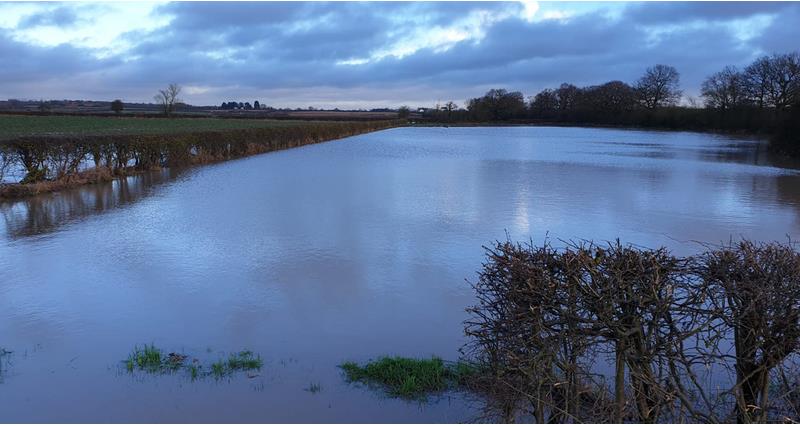The announcement of government grants through the Farming Recovery Fund will offer a small ray of sunshine for farmers in some areas after months of storms and relentless rain, but for many – especially in the crops sector – the winter washout will only add to the pressure of rising costs and wider uncertainty.
Experts fear the cost of this winter’s floods could be far greater than in previous years following two major storms, Babet on 16-21 October 2023 and Henk on 2-8 January 2024.
With Storm Babet beginning after much of the winter wheat and barley had already been planted in October, the work and expense of cultivating, drilling and carrying out pre-emergent sprays was wasted, with seed being flooded and failing to germinate in many areas. The flooding caused by Storm Henk then severely hampered recovery efforts.
Picking up the pieces
According to the Met Office, 2023 was the UK’s 11th wettest year in records going back to 1836, seeing a total of 1,290mm of rainfall, and 2023-24 saw the most active start to the storm season since naming storms began in 2015.
Babet caused chaos across Scotland and moved down England to particularly affect Yorkshire, the East Midlands and Humber area.
This was followed by weeks of persistent rain and then the arrival of Henk, which led to flooding in England and Wales and particularly across Nottinghamshire, Lincolnshire and Leicestershire.
One of the farmers picking up the pieces after the storms is Peter Gadd, who grows wheat, barley, beans and oilseed rape on just under 100 hectares at Stragglethorpe, in south Nottinghamshire.
“As farmers we are used to dealing with the weather, but we don’t frequently expect this level of destruction.”
NFU Midlands Combinable Crops Board chair Peter Gadd
Peter, who is chair of the NFU Midlands Combinable Crops Board, said: “We had completed our autumn cereal sowing a week or ten days before Babet with all the herbicide, labour, machinery and diesel costs that that involves. Many fields were trying to emerge, but they were completely overwhelmed by water flooding through the farm.
“It eventually coalesced in low-lying areas, and we were left with a large area of seed in the ground underwater for days, which killed much of what was trying to poke through and burst the seed still in the ground.”
Peter said there were dykes on the flood plain to channel the water away but in very heavy rain the larger rivers, which also took water from the Derbyshire hills and other catchments, could not cope with the increased volume, leading to the dykes backing up and overflowing.
Eventually the water began to move downstream, leaving Peter with a number of ponded areas, but it was swiftly followed by more rain falling on waterlogged ground, and other storms, including Henk, started the process again.
‘A huge area is now underwater until spring’
“With some improvement of infrastructure and application of maintenance in the larger rivers it would help floodwater to move away more quickly,” Peter added.
“The internal drainage boards are doing their best but they’re tearing their hair out because they can’t get the water away fast enough.
“We need desilting and devegetation of the waterways, spending in the right areas of infrastructure and maintenance of pumping stations and sluices. Some farms would happily undertake attenuation on their land if they could make it pay.
“A huge area is now underwater until spring and we won’t be able to crop it until then. Some land won’t be worth trying to get back in time for harvest 2024, so that’s all uninsured loss.”
Peter said luckily he had been able to order spring barley seed before prices soared due to the scarcity caused by flood damage, but there would not be enough seed to go round for everyone.
He added: “Sowing spring barley into winter wheat fields is not an easy thing to patch-in, practically. Some fields we will spray out completely, but it’s not the way I had planned it. I estimate 40% of our winter cereal has been compromised quite seriously. How much of that land we can resow will depend on how much it dries up in the spring, and any rainfall ahead.
“It’s very disappointing and demoralising to see what has happened that’s beyond our control. It’s very upsetting to see our hard work being destroyed. As farmers we are used to dealing with the weather, but we don’t frequently expect this level of destruction.
“It adds pressure all round on top of rising costs, reductions in BPS payments and other factors we don’t yet know about.”
Profits washed away
Mark Chatterton, a director at Midlands accountancy and business advisers Duncan & Toplis, said this year’s floods were the worst he’d seen at any time in his 24-year career, due to the scale and unfortunate timing of the rainfall.
He said the harvest following the floods of 2019 had showed an 18% drop in net profits among their clients – although in 2019 the flooding occurred when many fields were undrilled so the damage was more limited – and this year the effect on profits could be much worse, leading to poor cash flow for 2025.
“Speaking to farming families that had made all the right decisions, working day in and day out to run a profitable business only to find their profits washed away in front of their eyes is truly heartbreaking,” he added.
“My advice is to create a new cash flow forecast, work out the impact that the situation will have for the next two years, and work out ways to reduce costs throughout this period. This might mean putting off capital investments in property or carrying out non-urgent repairs and farmers should also look to draw on their private capital. Meanwhile, tax planning will be important because there will be large bills to pay on last year’s more successful harvest.”
